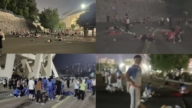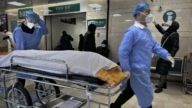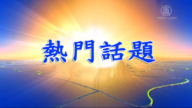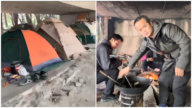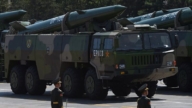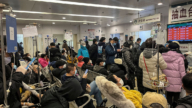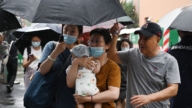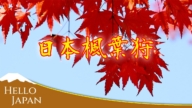【新唐人2011年6月1日訊】內蒙古大規模抗議示威持續已有十天,中共當局加派大批全副武裝的軍警,在呼和浩特、通遼、赤峰等內蒙各主要城市戒嚴,封鎖街道、大專院校和網絡通訊。外界輿論指出,中共對少數民族長期實行掠奪和滅絕政策,多年造成的民眾積怨靠武力是壓制不住的,反而會激化。
錫盟西烏旗牧民莫日根因阻攔在大草原上採礦、而被運煤車軋死後,蒙古族民眾抗議示威持續擴大,並透過網路發起5月30號「蒙族歷史英雄紀念日」大遊行。
當天,中共當局加派2千名武警封鎖大學區,呼和浩特市區出現大批荷槍實彈的武警,手持盾牌和警棍巡邏,封鎖新華廣場、成吉思汗廣場等主要廣場和街道,市中心停有多輛防暴裝甲車。
當地居民手機不斷收到公安局警告集會非法的簡訊。還有居民透露,所在單位開會威脅「誰上街就開除」。
內蒙古消息人士:「各大院校都戒嚴了,不准外出,武警出動,把著學校門口,不讓學生出來,怕學生們出來遊行。市政府、內蒙政府都把上崗了,消息都封鎖了,不讓你動,這兩天一直就上不了網。」
「南蒙古人權信息中心」主任恩赫巴圖表示,有約1千名牧民衝破封鎖,30號上午11點多舉著標語,喊著口號,到市中心抗議示威,要求釋放27號在正蘭旗抗議中被逮捕的近40名牧民,示威持續了近一個小時,又有幾十名牧民被抓。
《博訊網》引述消息說,曾參與六四鎮壓的解放軍第38軍,已經從駐地河北保定調往內蒙。這個未獲證實的消息,引起外界關注。
31號,當局在內蒙各個城市進一步部署警力,並向學生發出了宵禁通知。中共外交部發言人31號首次對內蒙示威表態,表示將嚴厲打擊製造事端者。
另一方面,中共也採用收買和安撫的手法,試圖平息蒙古族人的憤怒。30號,當局出臺改善內蒙礦區生態和居民利益等措施。
內蒙古自治區黨委書記、素有「小胡錦濤」之稱的胡春華,27號到西烏旗與教師和學生交流,他承認造成人命傷亡的事件「性質惡劣、民憤極大」,承諾將嚴懲罪犯,並表示要「處理好礦產開發與群眾利益的關係」。
恩赫巴圖(南蒙古人權信息中心主任):「他這很難安撫蒙古人的憤怒和不滿,因為蒙古人在自己的土地上受欺壓很長時間。胡春華的這種承諾,到底能不能按他承諾的這樣做,這也是一回兒事。」
當局27號罷免了西烏旗黨委書記海明的職務,並將擴大中等學校「免學費、免書費」的範圍。南蒙古人權信息中心說,死者莫日根的家人將獲得房子和60萬元的賠償。
流亡德國的「保衛內蒙人權同盟」主席 席海明:「內蒙的問題現在不是說一個牧民被軋死了這麼簡單,它主要是蒙古人整個生存危機,整個草原被破壞了。世界90%多的稀土在中國,中國99%(的稀土)在內蒙。現在高幹子弟拿著軍隊的批發權在那兒挖,以國家的名義。蒙古人最後沒有生計了,沒有活路了,最後剩下草原,有個草原法它又不保護。」
內蒙古自治區是中國最大的產煤區。2010年,內蒙古經濟增長速度以14.9%位居全國第四,躋身「GDP萬億俱樂部」。但這不僅沒有給牧民帶來好處,反而使草原遭到嚴重的破壞。
在美國的前中國佛教協會副會長、全國政協常委、青海省政協副主席阿嘉仁波切喇嘛說:「在內蒙,有大量的內地的移民,近期加上大量的開發,對環境保護和少數民族文化的侵蝕,非常非常的厲害。那麼這樣人們沒有辦法了以後,就有一句話說,人不反,官逼著反(官逼民反)。」
蒙古國、美國、德國、英國、法國、瑞典、日本、澳大利亞等地,30號舉行各種抗議活動聲援內蒙。中國過渡政府寫信給美國總統、歐盟主席及聯合國秘書長,呼籲阻止中共對內蒙民眾的鎮壓。
新唐人記者李元翰、周平綜合報導。
Inner Mongolia Tension Escalates
Ten days after large-scale protests broke out
in Inner Mongolia, Chinese Communist Party (CCP)
dispatched a large number of armed forces
to exert martial law in the major cities,
block streets and intensify Internet censorship.
Comments from overseas point out that the CCP’s
plundering and genocide policies on minorities cause
mounting public grievances, difficult to suppress.
After Mongolian herdsman Mo was struck and killed
by a coal vehicle for his defiance of mining
on Inner Mongolian grasslands,
people online were calling for a march on May 30,
while protests continue to grow.
2000 armed police were dispatched to block
the university district. Armed police with shields
and batons in hand appeared in downtown Hohhot,
blocking Xinhua Square and Genghis Khan Square.
Several anti-riot tanks appeared in the city center.
Local residents often received police text messages
saying that it is illegal to rally. Some employers
threatened to fire employees if they joined the rally.
Inner Mongolia Resident: “All colleges are under
curfew. Armed police blocks the campus entrance
to prevent students from leaving for a rally.
The CCP has blocked all information.
Internet is disconnected for two days now.”
Enghebatu, director of Southern Mongolia Human
Rights Information Center, said that 1000 herdsmen
broke through blockades to protest in the city center
with banners and slogans, requesting the release
of 27 people arrested on May 27. The protest lasted
about 1 hour; several dozen herdsmen were arrested.
Boxun Network said that the 38th Army of the PLA,
which participated in the Tiananmen Massacre,
has been deployed from their base in Hebei
to Inner Mongolia. This news sparked wide concern.
On May 31, the authorities continued to deploy
police forces in various cities and informed students
of a curfew. The foreign affairs spokesperson said
the that CCP would severely crack down
on those who cause problems.
The CCP also used soft methods to try and calm
Mongolians. On May 30, authorities announced
new policies to improve the ecology and residents’
well-being in the Inner Mongolian mining area.
Hu Chunhua, Party secretary of Inner Mongolia,
nicknamed “Junior Hu Jintao”, visited local teachers
and students on May 27. He acknowledged
the malicious nature of the incident. He promised
to punish the perpetrator and balance relationships
between mining development and local resident.
Enghebatu: “It is difficult for him to pacify
the long-accumulated anger and grievances
over their land. It is still dubious whether
Hu Chunhua is able to honor what he promised.”
On May 27, authorities fired the Party secretary
of West Ujimqin Banner, and offered more schools
“Free Tuition, Free Books.” Enghebatu said
that the family of the victim Mo will receive a house
and RMB600,000 as a compensation.
Xi Haiming, exiled chairman of Inner Mongolia
Human Rights League in Germany:
“The problem is not as simple as a herdsman’s death.
It is related to the survival crisis of the Mongols,
because the entire prairie has been destroyed.
Over 90% of world’s rare earth production
is in China, but 99% of it is in Inner Mongolia.
High-ranking CCP officials’ sons control production,
and Mongols are deprived of their livelihood
since the prairie is gone.
The so-called “prairie law” did not protect them.”
Inner Mongolia is China’s largest coal production
area. In 2010, its economic growth rate was 14.9%,
ranked No. 4 in China. Its development did not seem
to bring many benefits to the herdsmen. Instead,
it severely damaged the prairie and their life style.
Former Vice President of the Buddhist Association
of China, Ajia Rinpoche Lama: “The huge number
of immigrants to Inner Mongolia, plus recent
development and damage to the environment
and culture have had negative impacts.
When Mongols cannot see any prosperous way out,
they have no choice but to rebel.”
On May 30, various activities were held in Mongolia,
USA, Germany, UK, France and other countries
to protest CCP’s acts and support Inner Mongolians.
China Interim Government wrote to US President,
EU Chairman and UN Secretary General to urge
the CCP to stop the crackdown on Inner Mongolians.
NTD reporters Li Yuanhan and Zhou Ping


